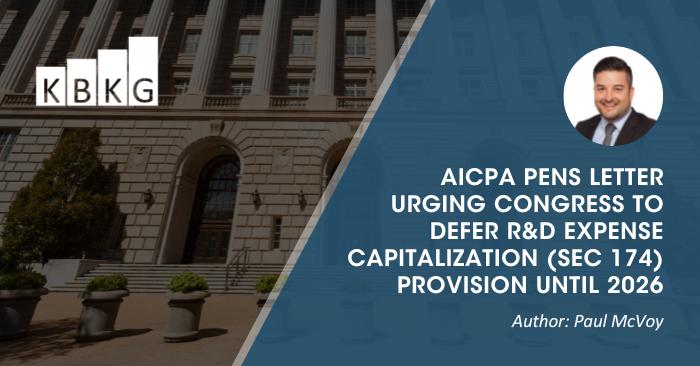On February 14, 2023, the American Institute of Certified Public Accountants (AICPA) sent a letter urging Congress to address expired and expiring tax provisions to avoid needless complexity and ambiguity.
More specifically, the AICPA called on Congress to defer the Internal Revenue Code Section 174 amortization requirement for research and experimental expenditures until 2026. The AICPA letter emphasized the confusion and uncertainty that taxpayers are experiencing during the current tax return filing season.
Section 174 of the Internal Revenue Code historically allowed taxpayers to deduct research and experimental expenditures as a current expense rather than capitalizing and amortizing them over time. The historical treatment incentivized businesses to invest in research and development, which can lead to innovation and growth. The Tax Cuts and Jobs Act of 2017 significantly changed the treatment of research and experimental expenditures, requiring certain domestic specified research and experimental expenditures, including software development costs, to be capitalized and amortized ratably over a five-year period (six-years with required mid-year convention). The effect on taxpayers has been immense.
The AICPA is recommending that Congress retroactively extend the effective date of amended IRC section 174 research and experimental expenditures amortization to amounts paid or incurred until tax years beginning after December 31, 2025. This extension would allow businesses to continue expensing research and development costs for an additional four years, simplifying tax compliance and minimizing confusion related to identifying costs that should be capitalized versus expensed. Furthermore, the AICPA also recommends a permanent extension of deductions for section 174 expenditures to avoid conflict and litigation.
The AICPA’s recommendation aligns with the broader concerns of the business community about the impact of tax policy on research and development. Many businesses argue that the tax system should incentivize research and development rather than imposing additional costs and administrative burdens on businesses. The AICPA’s recommendation is a recognition that the tax system can be used to support economic growth and innovation and that tax policy should be designed to encourage rather than discourage research and development.
It remains to be seen whether Congress will act on the AICPA’s recommendation. Still, the AICPA’s advocacy on this issue is an important reminder of tax policy’s role in supporting economic growth and innovation through research and development.
About KBKG
Established in 1999 with offices across the U.S., KBKG provides turn-key tax solutions to CPAs and businesses, including research and development tax credits, cost segregation, green building tax incentives (45L tax credits and 179D deductions), transfer pricing for multinational businesses, and more. KBKG has office locations nationwide with employees located in Los Angeles, San Diego, San Francisco, Seattle, Chicago, Detroit, Atlanta, New York City, and Dallas-Fort Worth.
For more information about KBKG, please visit KBKG.com.
About the Authors
 Paul McVoy – Principal
Paul McVoy – Principal
New York
Paul McVoy is a Principal for KBKG’s R&D Tax Credit Consulting practice, overseeing the practice from our New York office. In this role, Paul devotes his time to consulting companies in maximizing their R&D tax credit claims. Prior to joining KBKG, Paul was a manager at a Big Four accounting firm out of the Philadelphia, San Diego, and Los Angeles offices. » Full Bio


